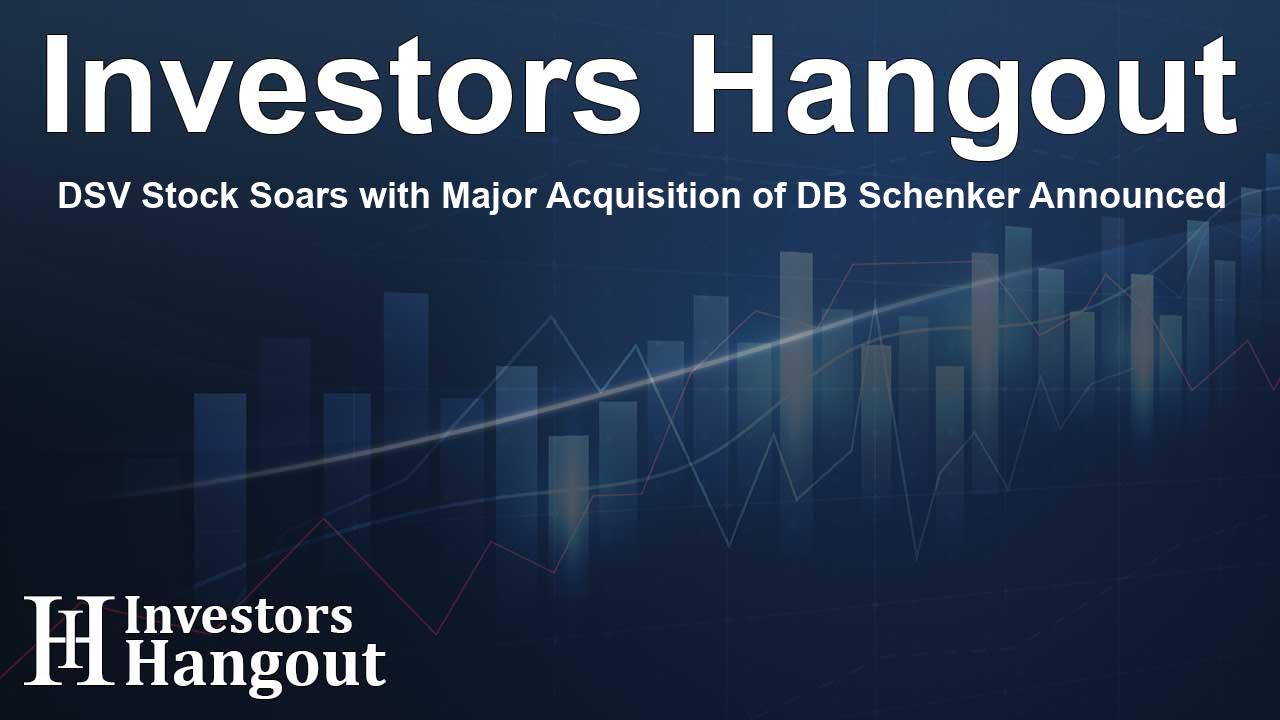DSV Stock Soars with Major Acquisition of DB Schenker Announced

DSV's Share Surge Following DB Schenker Acquisition
Shares of Danish logistics leader DSV (CSE: DSV) experienced a significant boost recently after news emerged that the company successfully bid to acquire DB Schenker, the rail logistics division of Deutsche Bahn. This strategic move marks DSV as a key player in the global logistics industry.
Key Details of the Acquisition
The proposed acquisition is valued at approximately 14 billion euros, setting a record as the largest purchase made by a Danish firm. Market analysts are watching the developments closely, noting that the deal could enhance DSV's market position and lead to a share price adjustment.
Analyst Insights on the Deal
Analysts from Citi Research have expressed optimism about the acquisition, suggesting it presents considerable opportunities for synergies. They foresee a potential increase in earnings per share, projecting an uptick of at least 26%, with a balanced approach between equity and debt financing.
Regulatory Review and Board Discussions
The transaction is subject to review by Deutsche Bahn's supervisory board. This board includes representatives from various sectors, including government officials and union members, who have raised concerns regarding potential job losses associated with the deal. Despite this opposition, support from the government as the owner of Deutsche Bahn seems to favor DSV's offer.
DSV's Strategic Growth Path
Upon completion of the acquisition, DSV is poised to become the world’s leading freight forwarder in terms of volume and revenue, surpassing its biggest competitor, Kuehne und Nagel. This transition aligns with DSV's consistent focus on growth through strategic acquisitions, which have previously included companies such as UTi, Panalpina, and Global Integrated Logistics (GIL).
Implications for Deutsche Bahn
Deutsche Bahn's decision to divest its most lucrative unit is part of a broader strategy to alleviate financial pressures and enhance investments in its passenger services. The company has faced significant challenges and is looking to reduce its substantial debt, which currently stands at around 30 billion euros.
Looking Forward
As the logistics landscape evolves, DSV's acquisition of DB Schenker is expected to set a new benchmark in the industry. Stakeholders remain keen on how DSV will integrate this new acquisition and capitalize on the vast opportunities that lay ahead.
Frequently Asked Questions
What is the value of DSV's acquisition of DB Schenker?
The deal is valued at approximately 14 billion euros.
How will the acquisition affect DSV's market position?
Once finalized, DSV will become the largest freight forwarder globally, enhancing its competitive edge.
What are analysts forecasting for DSV's earnings per share?
Analysts project an increase in earnings per share of at least 26% post-acquisition.
Who supports and opposes DSV's bid?
Support comes from the government, while union representatives have expressed concerns over potential job losses.
Why is Deutsche Bahn selling DB Schenker?
The sale aims to generate funds for domestic passenger service improvements and to reduce the company's substantial debt.
About The Author
Contact Dominic Sanders privately here. Or send an email with ATTN: Dominic Sanders as the subject to contact@investorshangout.com.
About Investors Hangout
Investors Hangout is a leading online stock forum for financial discussion and learning, offering a wide range of free tools and resources. It draws in traders of all levels, who exchange market knowledge, investigate trading tactics, and keep an eye on industry developments in real time. Featuring financial articles, stock message boards, quotes, charts, company profiles, and live news updates. Through cooperative learning and a wealth of informational resources, it helps users from novices creating their first portfolios to experts honing their techniques. Join Investors Hangout today: https://investorshangout.com/
The content of this article is based on factual, publicly available information and does not represent legal, financial, or investment advice. Investors Hangout does not offer financial advice, and the author is not a licensed financial advisor. Consult a qualified advisor before making any financial or investment decisions based on this article. This article should not be considered advice to purchase, sell, or hold any securities or other investments. If any of the material provided here is inaccurate, please contact us for corrections.
